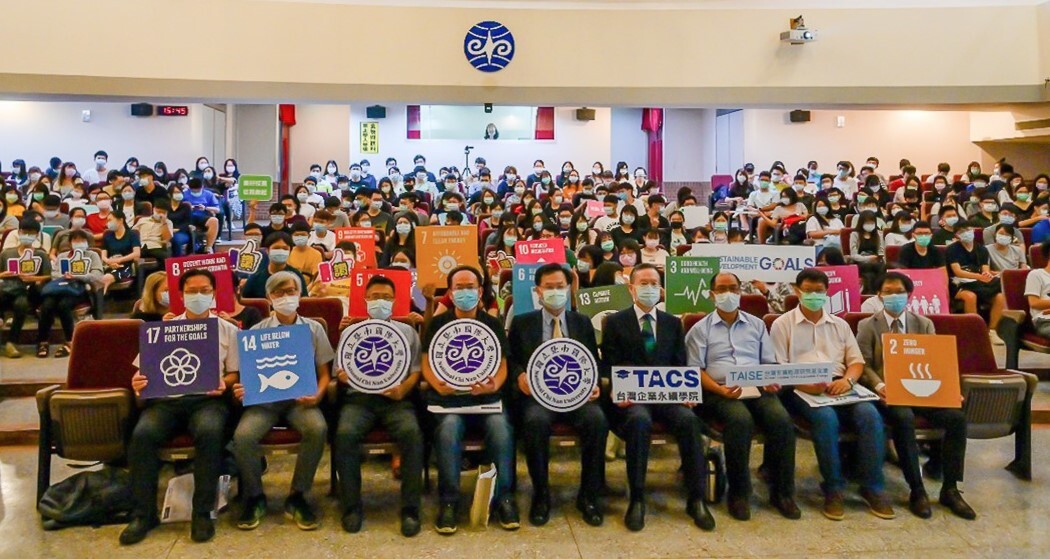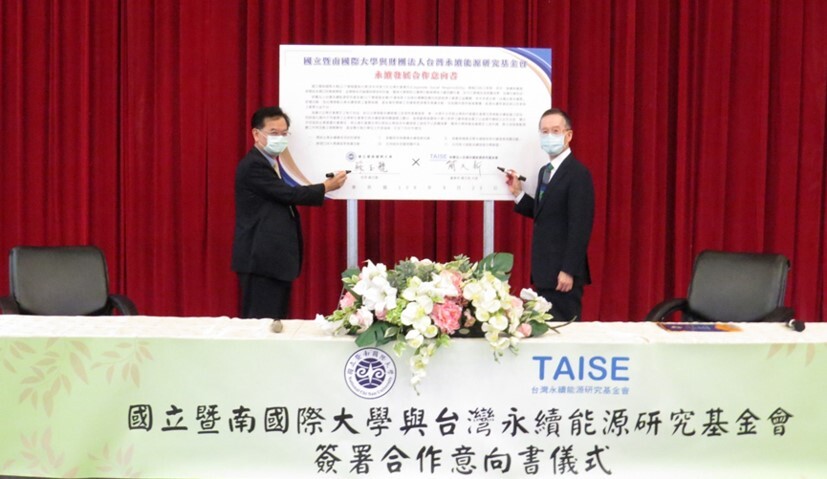
On behalf of National Chi Nan University (NCNU) and the Taiwan Institute for Sustainable Energy (TAISE), NCNU President Dr. Yuhlong Oliver Su and TAISE Chairman Dr. Eugene Chien signed a cooperative pact on Sept. 23 forming a new academic-business partnership championing the sustainable development of Taiwan.
In his speech preceding the signing ceremony, Dr. Chien, who served as the nation’s Representative to the United Kingdom between 1993 and 1997, discussed the challenges and opportunities afforded by the progress that defines the millennial era. The 17 Sustainable Development Goals (SDGs) set forth by the United Nations, he says, provide a valuable framework for evaluating such issues and the compounding effects of the global coronavirus pandemic.
Thanking Dr. Chien for his gracious presentation, Dr. Su explained that NCNU is a dedicated adopter and promoter of environmentally friendly practices, especially with regards to upgrading campus facilities and conducting outreach programs to uphold the UN’s 17 SDGs. These positive innovations have been commended as exemplary fruits of model academic-industry partnerships by Global Views Monthly Magazine’s “Outstanding University Social Responsibility Projects” 2020 rankings, Su added.
The advent of globalization has made it clear that universities can make a difference in this critical juncture of human development, by joining the search for a better future for our world. As a nonprofit organization founded to accelerate Taiwan’s transition into a low-carbon economy, TAISE can now tap into the university’s academic resources and join forces in deepening regional partnerships and cultivating local communities through care and assistance, education, environmental protection, civic participation, and strong, sustainable operations, added Dr. Su.
Dr. Chen Ku-fan, director of NCNU’s Environmental Protection and Occupational Safety and Health Center, noted that the university maintains a 79.8% green coverage of lawns, trees, and foliage on its 150-hectare campus.
The school’s management of energy efficiency has also been bolstered by such efforts as leasing solar photovoltaic equipment that will generate an estimated 1.5 megawatts of power, making NCNU the first project site in the government’s green energy roof program to challenge the 1-megawatt benchmark, he stated.
The objective of SDG 7, affordable and clean energy, can be achieved by seeking better solutions from nature. Chen says that overheating urban areas and the effects of excessive carbon emissions as a whole could be resolved through sustainable management of resources.
As a green university and a development center for sustainable energy, NCNU’s earliest blueprints include water-recycling facilities for processing waste water into grey water used for flushing toilets, watering plants, and irrigating butterfly habitat areas.
Future action plans include the further integration of liberal arts courses from the university’s four colleges, the continuous development of surrounding communities through joint projects and partnerships, and the advancement of interdisciplinary learning opportunities to help students become well-versed in the tenets of sustainability and the directives of the SDGs.
